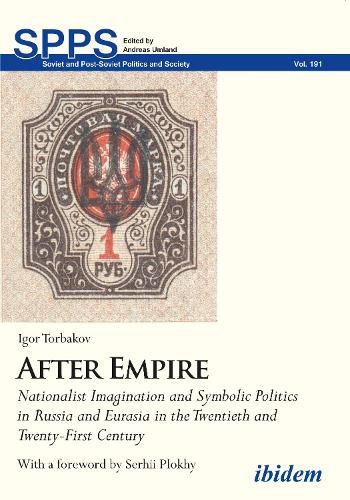Readings Newsletter
Become a Readings Member to make your shopping experience even easier.
Sign in or sign up for free!
You’re not far away from qualifying for FREE standard shipping within Australia
You’ve qualified for FREE standard shipping within Australia
The cart is loading…






Igor Torbakov explores the nexus between various forms of Russian political imagination and the apparently cyclic process of the decline and fall of Russia’s imperial polity over the last hundred years. While Russia’s historical process is by no means unique, two features of its historical development stand out. First, the country’s history is characterized by dramatic political discontinuity. In the past century, Russia changed its historical skin three times: following the disintegration of the Tsarist Empire accompanied by violent civil war, it was reconstituted as the communist USSR, whose breakup a quarter century ago led to the emergence of the present-day Russian Federation. Each of the dramatic transformations in the twentieth century powerfully affected the notion of what Russia is and what it means to be Russian. Second, alongside Russia’s political instability, there is, paradoxically, a striking picture of geopolitical stability and of remarkable longevity as an imperial entity. At least since the beginning of the eighteenth century, Russia has been a permanent geopolitical fixture on Europe’s northeastern margins with its persistent pretense to the status of a great power.
Against this backdrop, the book’s three sections investigate (a) the emergence and development of Eurasianism as a form of (post-)imperial ideology, (b) the crucial role Ukraine has historically played for the Russians’ self-understanding, and © contemporary Russian elites’ exercises in historical legitimation.
$9.00 standard shipping within Australia
FREE standard shipping within Australia for orders over $100.00
Express & International shipping calculated at checkout
Igor Torbakov explores the nexus between various forms of Russian political imagination and the apparently cyclic process of the decline and fall of Russia’s imperial polity over the last hundred years. While Russia’s historical process is by no means unique, two features of its historical development stand out. First, the country’s history is characterized by dramatic political discontinuity. In the past century, Russia changed its historical skin three times: following the disintegration of the Tsarist Empire accompanied by violent civil war, it was reconstituted as the communist USSR, whose breakup a quarter century ago led to the emergence of the present-day Russian Federation. Each of the dramatic transformations in the twentieth century powerfully affected the notion of what Russia is and what it means to be Russian. Second, alongside Russia’s political instability, there is, paradoxically, a striking picture of geopolitical stability and of remarkable longevity as an imperial entity. At least since the beginning of the eighteenth century, Russia has been a permanent geopolitical fixture on Europe’s northeastern margins with its persistent pretense to the status of a great power.
Against this backdrop, the book’s three sections investigate (a) the emergence and development of Eurasianism as a form of (post-)imperial ideology, (b) the crucial role Ukraine has historically played for the Russians’ self-understanding, and © contemporary Russian elites’ exercises in historical legitimation.